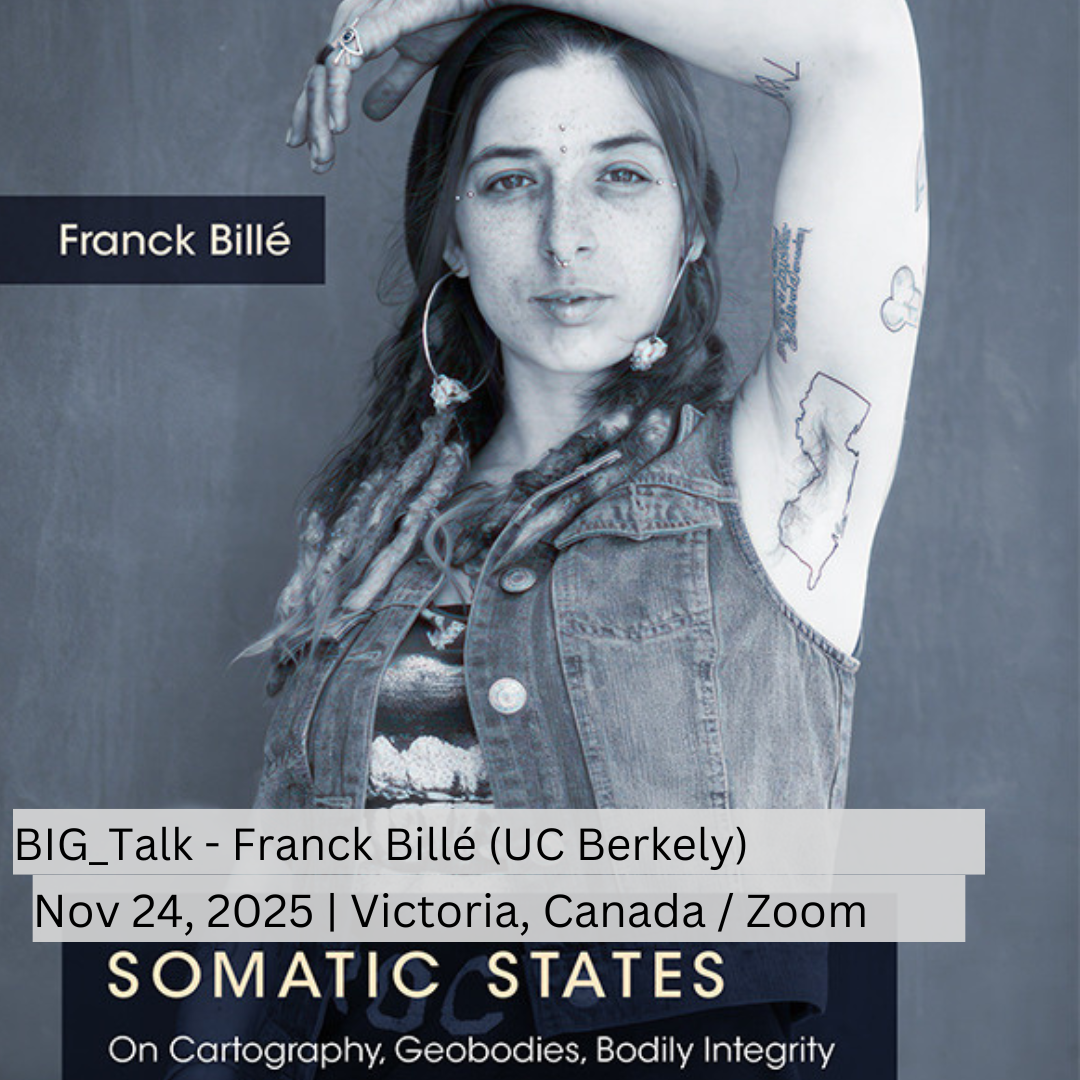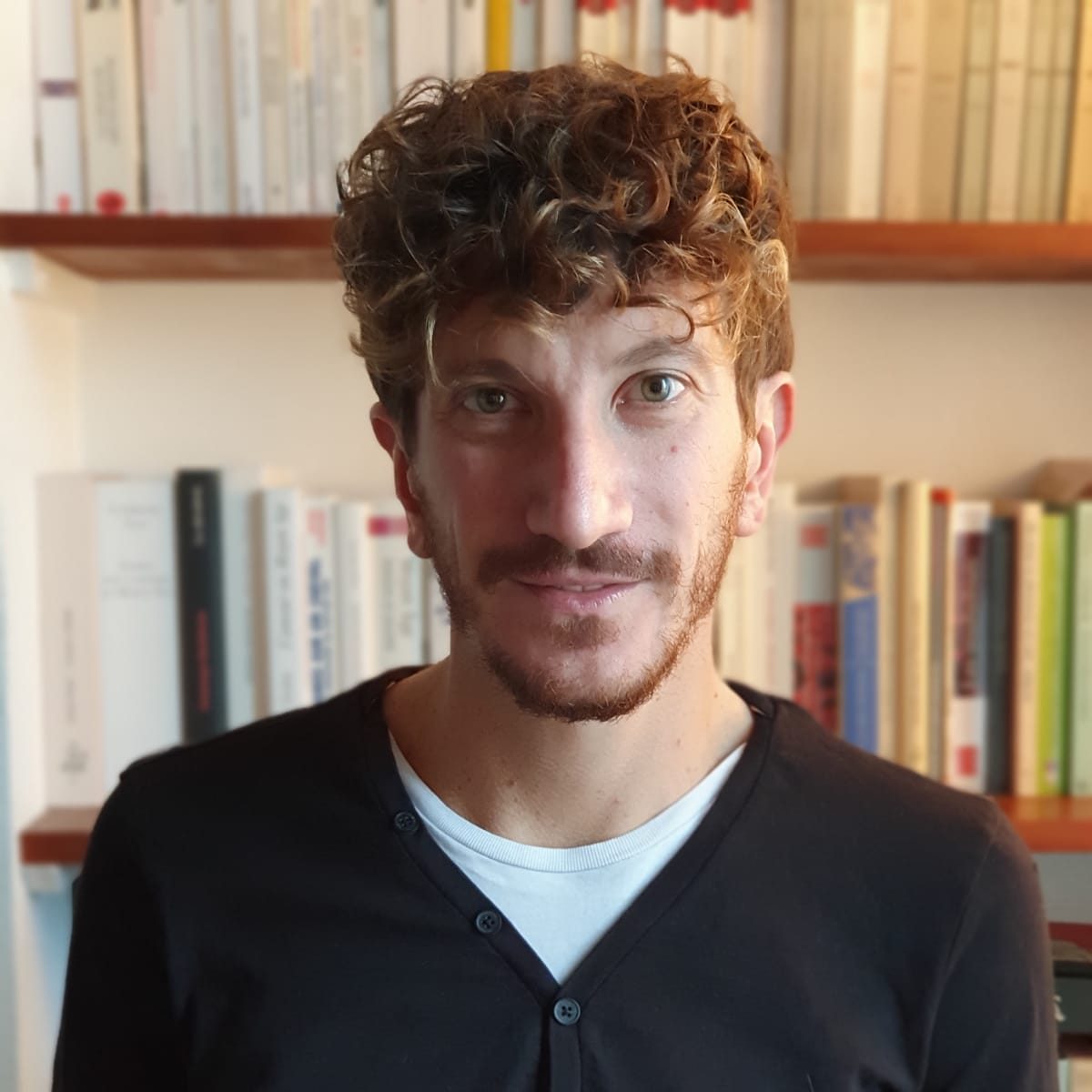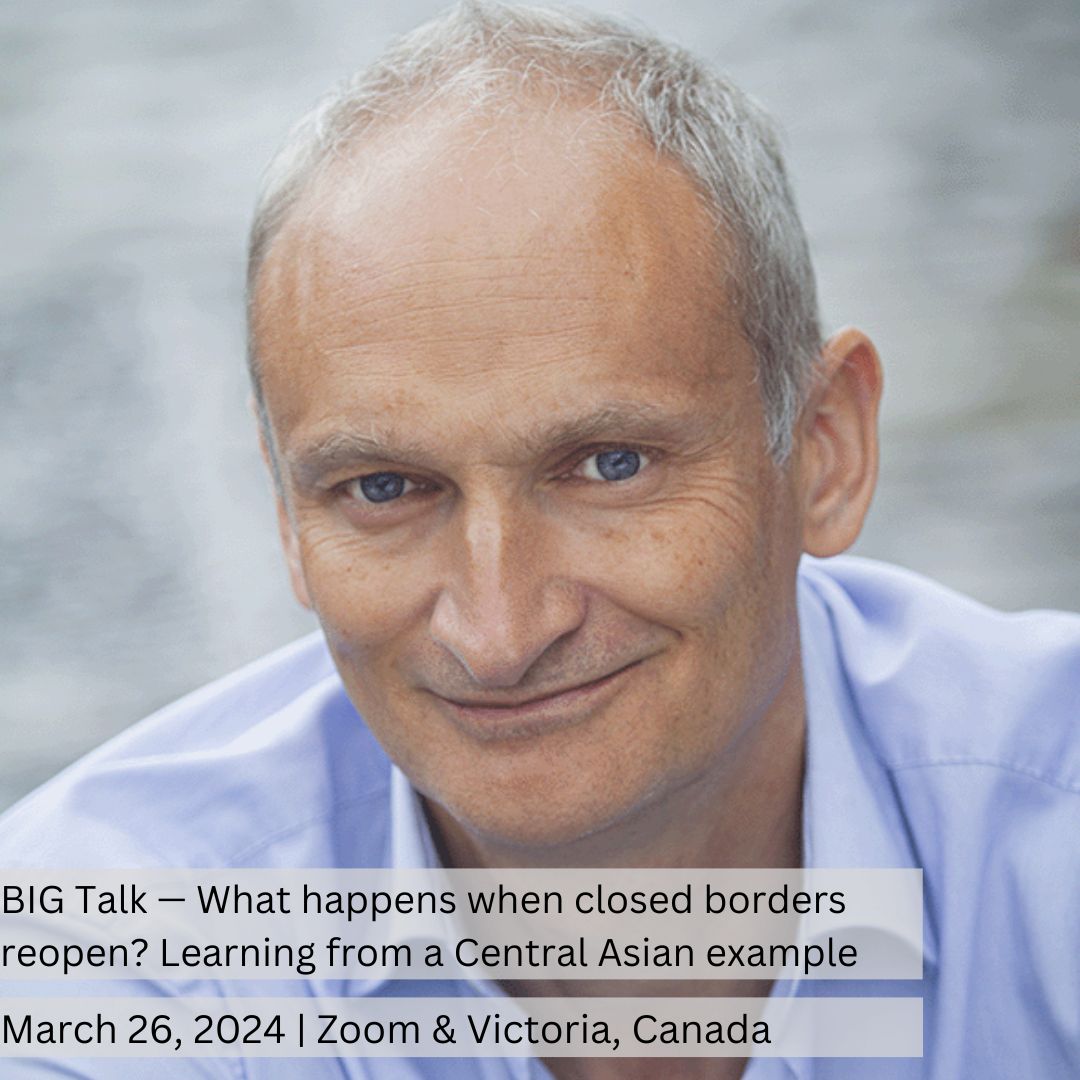Somatic States: On Cartography, Geobodies, Bodily Integrity.
Franck Billé (UC Berkely)
Join BIG_LAB on Monday, November 24th at 10 am (PST) at the University of Victoria (SED C168) or online via Zoom for a BIG_Talk by Franck Billé (UC Berkeley) on his latest book, Somatic States: On Cartography, Geobodies, Bodily Integrity.
Franck Billé (University of California, Berkeley) is an anthropologist and geographer working at the intersection of cartography, sovereignty, and territoriality. His research interest has led to several book projects organized around the theoretical foci of the volumetric, the corporeal, and the topological. His most recent books include Voluminous States: Sovereignty, Materiality, and the Territorial Imagination (2020), On the Edge: Life along the Russia-¬ China Border (with Caroline Humphrey, 2021), Writing in the Negative Space of the State (2024), and Somatic States: On Cartography, Geobodies, Bodily Integrity (2

#13 Frontlines Are Everywhere | Chad Corntassel Smith, Planting Seed Corn for Our Children’s Future
featuring Chad Corntassel Smith (Cherokee Nation)
In this episode, Jeff is joined by former Cherokee Nation Principal Chief Chad “Corntassel” Smith. They discuss Smith’s time as Principal Chief from 1999-2011, and delve into topics such as the importance of perpetuating cultural practices for future generations, the impact of the landmark McGirt Supreme Court decision (2020), and Smith’s previous books including “Leadership Lessons from the Cherokee Nation.” Smith also reflects on influential figures in his life, the Cherokee approach to adversity, and his hope for the Nation to become a “happy and healthy people,” emphasizing the importance of engaged citizens so that future generations will thrive.

Distinguished Resident Fellow – University of Victoria
Ted Parson
Edward A. (Ted) Parson is Dan and Rae Emmett Professor of Environmental Law and Faculty Director of the Emmett Institute on Climate Change and the Environment at the University of California, Los Angeles. Parson studies international environmental law and policy, the societal impacts and governance of disruptive technologies including geoengineering and artificial intelligence, and the political economy of regulation. Parson leads the AI Pulse program at UCLA Law, and organized the 2019 Summer Institute on AI and Society. His articles have appeared in scientific and scholarly journals in a wide range of fields, including Science, Nature, Climatic Change, Future, Issues in Science and Technology, the Journal of Economic Literature, and the Annual Review of Environment and Resources. His most recent books are The Science and Politics of Global Climate Change (with Andrew Dessler) (3rd ed. Cambridge, 2019), and A Subtle Balance: Evidence, Expertise, and Democracy in Public Policy and Governance, 1970-2010 (McGill-Queens University Press, 2015). His 2003 book, Protecting the Ozone Layer: Science and Strategy (Oxford), won the Sprout Award of the International Studies Association and is widely recognized as the authoritative account of the development of international cooperation to protect the ozone layer.
Parson has led and served on multiple advisory committees, for the National Academy of Sciences, the U.S. Global Change Research Program, and other national and international bodies. His work was influential in establishing the World Commission on Climate Overshoot, for which he serves as a senior advisor. He was formerly Joseph L. Sax Collegiate Professor of Law and Professor of Natural Resources and Environment at the University of Michigan, and spent twelve years on the faculty of Harvard’s Kennedy School of Government. In addition to his academic positions, Parson has worked and consulted for the White House Office of Science and Technology Policy, the Office of Technology Assessment of the U.S. Congress, the Privy Council Office of the Government of Canada, and the International Institute for Applied Systems Analysis (IIASA). He holds degrees in physics from the University of Toronto and in management science from the University of British Columbia, and a Ph.D. in Public Policy from Harvard. In former lives, he was a professional classical musician and an organizer of grass-roots environmental groups.

History and North American Borderlands: Insights and Approaches
BIG_Books
Borders are historically contingent and evolve through processes of bordering. Their meanings are constantly changing along with political, economic, and social developments taking place both externally between and internally within states. Like borders, borderlands must also be situated in their temporal and geographical contexts in order to investigate the relations between territory, identity, and sovereignty. The chapters in this collection present selective historical interpretations of borders and borderlands that focus primarily on North American borderlands, emphasizing flows, sovereignty, and indigeneity, three key themes of the Borders in Globalization program.
Read History and North American Borderlands: Insights and Approaches online for free at the link below.

Senior Non-Resident Fellow – Université Grenoble-Alpes
Pierre-Alexandre Beylier
Pierre-Alexandre Beylier is Full Professor of North American Civilization at Grenoble-Alpes University. An alumnus of the École Normale Supérieure de Cachan, his research focuses on North American borders. After studying the process of securitization of the Canada/US border in the wake of the September 11, 2001 attacks, he turned his attention more specifically to cross-border regions and border cities in North America, taking a more local approach to analyzing the impact of borders on the communities living along them. He is now working on the notion of “queer borders”, or how people from LGBTQ+ communities interact with borders in a context of advanced securitization. He is the author of two books: Canada/États-Unis – Les Enjeux d’une frontière (Presses Universitaires de Rennes) and Constructing a Cross-Border Region in the Pacific Northwest – The Residents of Cascadia at the Canada/US Border (Routledge).
Pierre-Alexandre Beylier est Professeur des Universités en civilisation nord-américaine à l’Université Grenoble-Alpes. Agrégé d’anglais et ancien élève de l’École Normale Supérieure de Cachan ses recherches portent sur les frontières nord-américaines. Après avoir étudié, dans le cadre de sa thèse, le processus de sécurisation qu’a connue la frontière Canada/États-Unis dans le sillage des attentats du 11 septembre 2001, il s’est ensuite intéressé plus spécifiquement aux régions transfrontalières et aux villes-frontières en Amérique du Nord dans une approche plus locale afin d’analyser l’impact qu’ont les frontières sur les communautés qui vivent à leur abord. Il travaille désormais sur la notion de « queer borders » ou comment les personnes issues de la communautés LGBTQ+ interagissent avec les frontières dans un contexte de sécurisation avancée. Il est l’auteur de deux ouvrages : Canada/États-Unis : Les Enjeux d’une frontière (aux Presses Universitaires de Rennes) et Constructing a Cross-Border Region in the Pacific Northwest – The Residents of Cascadia at the Canada/US Border (chez Routledge).

Distinguished Non-Resident Fellow – Arizona State University
Irasema Coronado

Summer Institutes
Thomas Cantens
World Customs Organization
Thomas Cantens is the Director of Policy at the World Customs Organisation. Previously, he was resident Advisor of the Director General of Niger Customs, and was the head of the Research Unit at the World Customs Organization in Brussels. Prior to taking his position at the WCO, he also served in investigation and intelligence in French Customs and in three sub-Saharan Customs administrations. Thomas is an Associate Researcher at the Research Centre on International Development of the Auvergne University (CERDI, France). Having initially graduated as an engineer (POLYTECH Montpellier, France), he holds a PhD in social anthropology and ethnology (Ecole des Hautes Etudes en Sciences Sociales, France) and a certificate in geospatial analysis (Ecole Nationale des Sciences Géographiques, France). He has published articles, research papers and books on customs reforms, quantification, and fragility and taxation.”

BIG Talk — What happens when closed borders reopen? Learning from a Central Asian example
with Dr. Nick Megoran (Visiting Fellow, Borders in Globalization) | Victoria, BC & Zoom | March 26, 2024
In Person: CFGS C168 (Sedgewick Building, University of Victoria) or Zoom. The meeting will take place from 12:00pm to 1:30pm PST. Register in advance for this meeting here. Registration is free but required.
Much recent work in border studies has focussed on the violence of border closures. In an age of right-wing populism and xenophobia this is important but reflects western-centric preoccupations. There are other processes taking place in other parts of the world that sometimes get missed. This paper tells one of them, based on over 25 years conducting fieldwork in a village on the Kyrgyzstan–Uzbekistan boundary. Dissected by new boundaries and borders in the late 1990s and early 2000s, with a change of political leadership since 2016 a gradual reopening of previously-closed crossings has occurred. This has happened without any of the damaging consequences that the politicians who closed the borders in the first place warned of. This seminar presents this story and asks what it says about our understanding of processes in an increasingly-bordered today.
Nick Megoran is a Visiting Fellow working with the Borders in Globalization program and the Centre for Global Studies and Professor of Political Geography at Newcastle University. His work focuses on nationalism and border dynamics in the Danish–German and Uzbek–Kyrgyz borderlands, which he has been researching for three decades. He has authored numerous articles and books on this topic, including Nationalism in Central Asia: A Biography of the Uzbekistan-Kyrgyzstan Boundary (Pittsburgh 2017).

#28 & #29 BIG Podcast – Hadrian’s Wall, Frontiers of the Roman Empire and Border Studies (Part One)
featuring archeologist David J. Breeze, British archaeologist and scholar of Hadrian’s Wall, the Antonine’s Wall, and the Roman army
The history of the Roman Empire is intertwined with the control of the entire Mediterranean Sea and reached at its peak 5 million km² for 60 million inhabitants. The empire was heterogeneous and expanded through conquests and was maintained through a network of frontiers and a system of friendly, allies or “client” states (reges amicique populi Romani). Due to rebellions from some tribes as the Brigantes, and after having visited the Danube and Rhine frontiers, the Roman Emperor Hadrian (reigned 117–138) came to Britannia in July 122 BC. By ordering the construction of the Wall (between 122 – and maybe before according to certain authors – and 127 AD), Hadrian put an end to the territorial expansion of the Roman Empire. In short, Hadrian adopted a policy of protecting frontiers without expansion.
What functions did the borders of the Roman Empire have? What functions did Hadrian’s Wall have? Can the frontiers of the Roman Empire be considered strict separations between the civilized (Roman) world and the world of the barbarians (“qui barbaros Romanosque Divideret”)? How is archeology an interesting and relevant discipline for Border Studies? We will discuss all this and get answers with archeologist David J. Breeze.
Listen to #28 (Part One): Apple Podcasts, Spotify, and YouTube.
Listen to #29 (Part Two): Apple Podcasts, Spotify, and YouTube.
David J. Breeze is an archaeologist, teacher, and scholar of Hadrian’s Wall, the Antonine Wall, and the Roman army. He has been Chair of the International Congress of Roman Frontier Studies and President of several archaeological societies in the UK. He was Chief Inspector of Ancient Monuments for Scotland from 1989 to 2005, and subsequently led the team which successfully nominated the Antonine Wall as a World Heritage Site in 2008. David has excavated on both Hadrian’s Wall and the Antonine Wall and written several books on these frontiers, on frontiers elsewhere in the Roman Empire and on the Roman army.

#26 and #27 BIG Podcast – “Nation State Model and Creative Solutions for Border Problems”
featuring Nick Megoran, Political Geographer at Newcastle University, England
The Nation-State model is built on the synchronization between a so-called state territory and a so-called national population. The mechanical imposition of this specific model has led to serious conflicts in certain parts of the world (we will discover the ancient situation of Denmark/Germany border and the current one of Kyrgyzstan/Uzbekistan border). There have been several ways of thinking and representing the construction of this nation-state with its constituent factors, its regime of political sovereignty and territorial boundaries: community of origin, community of language, community of interests and values, cultural homogenization, elective community, common history and territorial patriotism but also imagined community. What are the consequences of this model on the design of the country’s borders? How to organize borderlands while avoiding conflicts with neighbors? With Nick Megoran, this podcast (in 2 parts) is an opportunity to talk about several original practices such as condominiums, joint development zones, territorial leasing, enclaves, the exchange of territory, statutory autonomy, free and customs zones, mobile borders, decoupling of international borders from other functional or administrative limits, juridical and economic cross-border cooperation. So many illustrations that allow us to think differently about sovereignty and state borders. Sovereignty doesn’t have to be Zero-Sum. Borders don’t have to be Walls and Barriers.
Listen to #26 (Part One): Apple Podcasts, Spotify, and YouTube.
Listen to #27 (Part Two): Apple Podcasts, Spotify, and YouTube.
Nick Megoran is a Visiting Fellow working with the Borders in Globalization program and the Centre for Global Studies and Professor of Political Geography at Newcastle University. His work focuses on nationalism and border dynamics in the Danish-German and Uzbek-Kyrgyz borderlands, which he has been researching for three decades. He has authored numerous articles and books on this topic, including Nationalism in Central Asia: A Biography of the Uzbekistan-Kyrgyzstan Boundary (Pittsburgh 2017).

